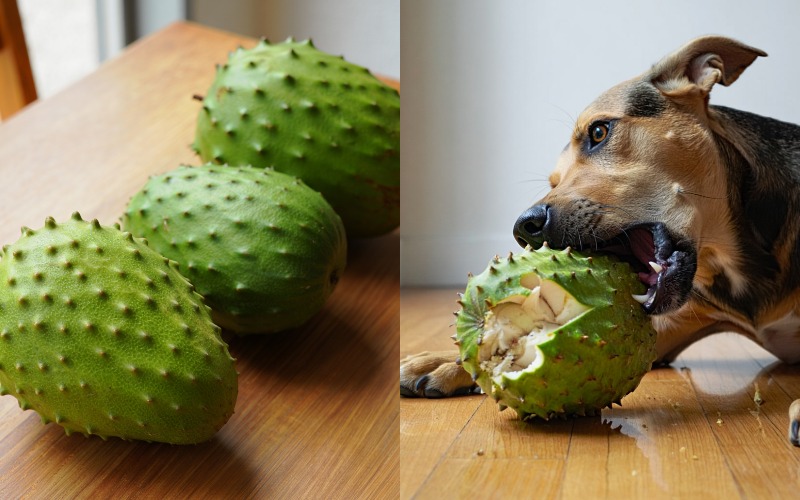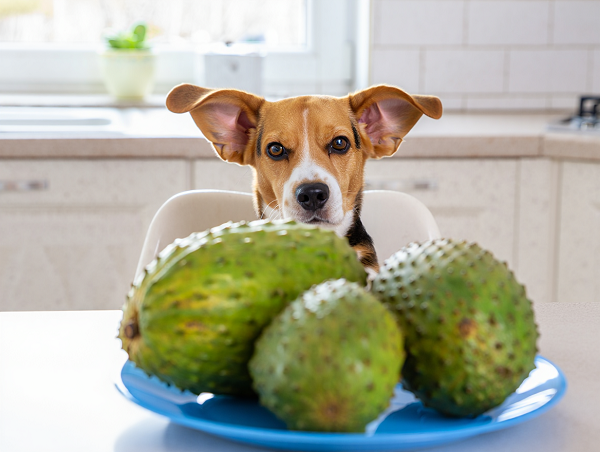Soursop, also known as graviola, is a tropical fruit celebrated for its delicious flavor and numerous health benefits for humans. Its sweet and tangy taste, combined with a soft, creamy texture, makes it a popular ingredient in smoothies, desserts, and juices. But if you’re a dog owner, you may find yourself wondering: can dogs eat soursop? Is this fruit safe for your canine friend, or does it pose risks?
Advertisement-Continue Reading Below

In this article, we’ll explore the pros and cons of soursop for dogs, its potential health benefits and risks, and what you should know before offering it to your pet. By the end, you’ll have a better understanding of whether or not soursop is a healthy snack option for your furry companion.
What Is Soursop?
Soursop, or Annona muricata, is a green, spiky fruit that grows in tropical and subtropical regions, including Central America, South America, and parts of Asia. The fruit has a soft, white pulp with a sweet, tangy flavor, often compared to a mix of strawberry, pineapple, and citrus. It’s rich in vitamins, antioxidants, and dietary fiber, and is commonly used in beverages, desserts, and even traditional medicines.
Although soursop is highly nutritious for humans, it’s important to consider whether these same nutrients are suitable or safe for dogs.
Nutritional Profile of Soursop
Soursop contains a variety of nutrients that can be beneficial for humans. Here’s a quick look at the nutritional content of soursop per 100 grams:
-
Calories: 66 kcal
-
Carbohydrates: 16.5 g
-
Fiber: 3.3 g
-
Protein: 1 g
-
Fat: 0.3 g
-
Vitamin C: 20.6 mg (34% of the daily value)
-
Potassium: 278 mg
-
Magnesium: 37 mg
-
Iron: 0.6 mg
-
Calcium: 14 mg
These nutrients contribute to soursop’s potential health benefits, including its antioxidant properties, immune-boosting capabilities, and potential anti-inflammatory effects. However, dogs have different dietary needs and digestive systems than humans, which is why it’s crucial to evaluate how this fruit impacts them specifically.

Can Dogs Eat Soursop? The Short Answer
In moderation, yes, dogs can eat soursop. However, there are important considerations to keep in mind. Soursop is not toxic to dogs, but its seeds, stem, and leaves contain substances that could be harmful. Additionally, dogs have different nutritional needs than humans, and feeding them soursop in large quantities could lead to digestive issues or other health concerns.
Let’s dive deeper into why soursop can be both beneficial and risky for dogs.
Potential Health Benefits of Soursop for Dogs
Yes, there are some potential health benefits of soursop for dogs, including its natural anti-inflammatory, antioxidant, and antimicrobial properties, which may support immune health and help combat certain infections—but it should be given in moderation and under veterinary guidance due to possible toxicity risks. Here they are:
Rich in Vitamin C
Soursop is an excellent source of Vitamin C, which is essential for your dog’s immune system, skin health, and tissue repair. While dogs typically produce their own Vitamin C, supplementing with foods that contain this nutrient can provide extra support for their overall health.
Contains Antioxidants
Soursop is packed with antioxidants, such as flavonoids and acetogenins, which may help combat free radicals in the body. Antioxidants can be beneficial for your dog’s long-term health, supporting their immune system, fighting inflammation, and potentially reducing the risk of chronic diseases.
Fiber for Digestive Health
Fiber is essential for maintaining healthy digestion, and soursop contains a fair amount of fiber. Moderate consumption of soursop can contribute to your dog’s overall digestive health, supporting regular bowel movements and potentially preventing constipation.
Anti-Inflammatory Effects
Soursop has been traditionally used for its anti-inflammatory properties in humans. If your dog suffers from joint pain or inflammation, consuming small amounts of soursop might provide a mild anti-inflammatory effect that could help alleviate some discomfort.
Potential Risks and Side Effects of Soursop for Dogs
While soursop has some health benefits for dogs, it also presents several risks that owners need to be aware of. Here are the primary concerns:
Toxic Seeds
The seeds of soursop contain compounds called annocatacin and annonacin, which can be toxic to both humans and animals when consumed in large amounts. While a small amount of seeds may not cause immediate harm, ingesting too many seeds can lead to toxicity. The seeds should never be given to dogs, and they should always be removed before offering the fruit.
High Sugar Content
Soursop has a relatively high sugar content, which may not be suitable for dogs, especially those who are overweight or have diabetes. Excess sugar intake can contribute to weight gain, high blood sugar levels, and even dental problems. If you want to offer soursop to your dog, be sure to do so in moderation and avoid giving it to dogs with pre-existing health conditions like diabetes.
Gastrointestinal Upset
Although soursop contains beneficial fiber, its high fiber content can sometimes cause digestive upset in dogs, especially if consumed in large quantities. This could lead to diarrhea, bloating, or stomach discomfort. Start with a small amount to see how your dog reacts before offering more.
Allergic Reactions
As with any new food, there is always the possibility of an allergic reaction. Symptoms of a food allergy in dogs can include itching, swelling, vomiting, diarrhea, and difficulty breathing. If you notice any of these symptoms after feeding your dog soursop, contact your veterinarian immediately.
How to Safely Offer Soursop to Your Dog
If you’re interested in giving your dog soursop, there are a few important safety tips to follow to ensure it’s done properly:
Remove the Seeds and Skin
Before offering soursop to your dog, make sure to remove all seeds, the skin, and any other inedible parts of the fruit. Only the flesh of the fruit should be offered, as seeds can cause toxicity and digestive issues. The skin is also not easily digestible for dogs and could lead to an upset stomach.
Serve in Small Quantities
Moderation is key. Start by offering a small piece of the fruit to see how your dog reacts. If there are no signs of digestive upset or allergic reactions, you can gradually increase the amount. However, it’s important not to overdo it, as the high sugar content can cause problems if consumed in excess.
Observe for Adverse Reactions
After offering soursop to your dog, observe them closely for any signs of discomfort or adverse reactions. If they show signs of gastrointestinal distress, vomiting, diarrhea, or skin reactions, stop feeding them soursop and consult your veterinarian.
Consult Your Veterinarian
Before introducing any new food, including soursop, it’s always a good idea to consult with your veterinarian. They can provide personalized advice based on your dog’s health status, age, breed, and any underlying conditions they may have.

What Other Fruits Can Dogs Eat?
If you’re looking for other fruits that are safe for dogs to enjoy, there are many options to choose from. Here are a few fruits that are generally safe for dogs:
-
Apples (without seeds)
-
Bananas (in moderation)
-
Blueberries
-
Watermelon (without seeds)
-
Pineapple (in small amounts)
-
Strawberries
-
Pears (without seeds or core)
-
Peaches (without pit)
Remember, each dog is different, so it’s important to start with small portions and monitor your dog’s response. Avoid offering fruit that’s high in sugar or contains toxic seeds, pits, or stems.
Additional Health Considerations When Feeding Dogs Soursop
While soursop can be beneficial in small amounts for dogs, it’s also important to be aware of additional factors and hidden risks that can arise when introducing this tropical fruit into your dog’s diet. Below are some more insights into the health considerations when feeding soursop to your dog.
1. Soursop’s Impact on Dogs with Specific Health Conditions
If your dog has pre-existing conditions such as diabetes, kidney disease, or gastrointestinal disorders, introducing a new fruit like soursop should be done with extra caution.
Diabetes: The natural sugars in soursop could cause a spike in blood sugar levels, which can be harmful for diabetic dogs. Even though soursop’s glycemic index may not be as high as some other fruits, it’s still important to avoid sugary treats in diabetic dogs. Always consult your veterinarian before adding new fruits to a diabetic dog’s diet.
Kidney Disease: Soursop is rich in potassium, which is a mineral that supports heart and muscle function. However, dogs with kidney disease often need to limit their potassium intake to avoid further stress on their kidneys. Too much potassium can lead to hyperkalemia (elevated potassium levels in the blood), which can be life-threatening.
Gastrointestinal Issues: Soursop’s high fiber content can be beneficial for digestive health but can also be too much for dogs with sensitive stomachs or conditions like IBD (inflammatory bowel disease) or gastroenteritis. Fiber in excess could exacerbate diarrhea, bloating, or other digestive issues.
2. Are Soursop Leaves Safe for Dogs?
When discussing soursop, it’s essential to mention the leaves of the tree. Soursop leaves contain compounds that are highly toxic to dogs. Some studies suggest that these leaves may contain acetogenins, which have been linked to neurotoxic effects and are generally harmful to both humans and animals when consumed in large quantities.
In many cultures, soursop leaves are used for medicinal purposes, such as in teas for their supposed anti-inflammatory properties. However, for dogs, it’s important to avoid the leaves completely, as even small amounts can lead to severe health consequences. If your dog ever chews on soursop leaves or consumes them accidentally, contact a vet immediately.
3. Does Soursop Affect Dog’s Blood Pressure?
One of the components of soursop is acetogenins, a class of chemicals that are known for their potential to lower blood pressure. While this might seem beneficial for humans, low blood pressure (hypotension) can be dangerous for dogs, especially those who already have heart or circulation issues. While there is no direct evidence showing that soursop causes hypotension in dogs, it is worth noting the effects that acetogenins could have when consumed in larger amounts over time. Always be cautious with introducing any fruit, especially one with compounds that can affect circulation and heart health.
4. Soursop for Dogs with Allergies or Skin Conditions
In addition to food allergies, some dogs suffer from skin sensitivities or conditions like atopic dermatitis, which could make them more susceptible to reactions from certain foods, including soursop. If your dog has chronic skin conditions or a tendency to have allergic flare-ups, introducing soursop could trigger symptoms such as itching, redness, or swelling.
If you decide to try feeding your dog soursop, it’s best to start with a very small piece and observe how they react, especially in terms of skin conditions. Keep an eye on their coat for any signs of dryness or irritation that could indicate an allergic response.
Soursop as Part of a Dog’s Healthy Diet
While it’s clear that soursop should not be an everyday treat for your dog, it can be a good occasional snack, especially if your dog is in good health. As a natural source of vitamin C and antioxidants, soursop can contribute to your dog’s overall wellness in moderation.
However, it’s crucial that soursop is part of a well-balanced, nutritionally complete dog diet. Fruits like apples, watermelon, and blueberries, which are lower in sugar and higher in fiber, should be considered more regular options for a dog’s snack. Soursop can serve as a special treat every once in a while, particularly if your dog has a need for extra immune support, but it should never replace regular dog food.
Soursop as a Hypoallergenic Fruit Alternative for Dogs
Some dogs suffer from food allergies or intolerances to certain ingredients commonly found in processed dog foods. Ingredients such as corn, soy, and wheat often cause allergic reactions in dogs, leading to symptoms like vomiting, itching, or skin rashes. If your dog is one of these sensitive individuals, soursop might be a viable hypoallergenic fruit alternative.
Since soursop is not a common ingredient in processed dog food, it’s less likely to cause allergic reactions compared to more common fruits. However, this does not mean that you should go overboard. Always start with small portions and observe any signs of an allergy.

Signs Your Dog May Be Overeating Soursop
Even though soursop is generally safe for dogs when given in small amounts, overeating can lead to digestive upset. Some signs that your dog may have consumed too much soursop include:
Vomiting: If your dog vomits after consuming soursop, it may be a sign that they have eaten too much.
Diarrhea: Excessive fiber and sugar can cause gastrointestinal distress, leading to diarrhea or loose stools.
Lethargy: Dogs may feel tired or lethargic if they experience a sugar crash or digestive upset after eating too much fruit.
Bloating: If your dog is bloated or appears uncomfortable in their abdomen, this could be a result of eating too much soursop, especially if they are not used to eating fiber-rich foods.
If you observe any of these symptoms, stop feeding them soursop and consult your veterinarian if the symptoms persist.
What Should You Do if Your Dog Eats Soursop Seeds?
As mentioned earlier, soursop seeds contain compounds that can be toxic to dogs, and consuming them can lead to serious health issues. If you suspect that your dog has ingested soursop seeds, here’s what you should do:
Monitor for Symptoms: Keep a close eye on your dog for any signs of distress, such as vomiting, lethargy, diarrhea, or loss of appetite.
Call Your Veterinarian: Even if you don’t notice any immediate symptoms, it’s always a good idea to call your veterinarian. They may recommend bringing your dog in for a check-up or induce vomiting to prevent further absorption of the toxins.
Provide Fresh Water: Ensure that your dog has access to clean water, which can help flush out any potential toxins and keep them hydrated.
Follow Your Vet’s Advice: Based on the amount of seeds consumed, your vet will provide specific instructions on how to proceed. This might include observation at home or a visit to the clinic for more intensive care.

Frequently Asked Questions (FAQs)
Below are answers to some of the most common questions pet owners have when considering whether to introduce soursop into their dog’s diet.
1. Is soursop safe for dogs?
Yes, soursop can be safe for dogs in moderation, provided you remove the seeds, skin, and leaves. These parts of the fruit contain substances that may be harmful to your pet. Always offer small portions of the flesh and watch for any signs of adverse reactions.
2. Can soursop help with my dog’s immune system?
Yes, soursop contains Vitamin C and antioxidants, both of which may support your dog’s immune health. However, it’s best to consult with your vet before introducing soursop, especially if your dog has existing health issues.
3. What should I do if my dog eats soursop seeds?
If your dog consumes soursop seeds, contact your veterinarian immediately. Seeds contain potentially toxic compounds and can lead to digestive issues or more serious health problems if ingested in significant amounts.
4. Can soursop cause upset stomachs in dogs?
Yes, feeding your dog too much soursop can result in gastrointestinal upset, including diarrhea or vomiting. The fruit is high in fiber, and too much fiber can irritate your dog’s digestive system. Always introduce new foods slowly and monitor your dog closely.
5. Is soursop a good treat for diabetic dogs?
Soursop is not recommended for diabetic dogs. The fruit contains a significant amount of sugar, which can cause spikes in blood glucose levels. If your dog is diabetic, consult with your vet for safer treat options.
6. Can puppies eat soursop?
Puppies can consume soursop, but it should be introduced cautiously and in moderation. Their digestive systems are more sensitive, and it’s best to wait until they are older before offering new fruits. Always consult with a vet for guidance on introducing soursop to your puppy.
7. What are the signs that my dog is having a bad reaction to soursop?
If your dog shows signs such as vomiting, diarrhea, lethargy, bloating, or changes in appetite after eating soursop, it could be having an adverse reaction. In such cases, stop offering soursop and contact your veterinarian immediately.
8. Can soursop help with my dog’s coat and skin health?
Soursop contains antioxidants that may help support your dog’s overall skin and coat health, but it should not replace regular care or a balanced diet. Talk to your vet if you are looking for ways to improve your dog’s skin and coat.
9. Are there any breeds of dogs that should avoid soursop?
While no specific breed is known to have a higher sensitivity to soursop, dogs with existing health conditions, such as those with kidney disease, pancreatitis, or food allergies, should avoid soursop. Always check with your veterinarian before adding a new food to your dog’s diet.
10. Can soursop be used as a natural remedy for dog arthritis or inflammation?
There is no strong evidence suggesting that soursop is an effective treatment for dog arthritis or inflammation. While soursop has some anti-inflammatory properties in humans, it’s best to rely on vet-recommended treatments for managing arthritis in dogs.
11. Can I feed my dog soursop as a substitute for other fruits like apples or bananas?
While soursop can be offered as a treat, it should not replace other fruits that are known to be dog-safe, such as apples or bananas. It’s important to diversify your dog’s diet to ensure they get all the nutrients they need.
12. How do I prepare soursop for my dog?
To prepare soursop for your dog, remove the seeds, skin, and any fibrous parts. Only offer small amounts of the flesh, either fresh or frozen, and monitor your pet for any signs of digestive upset. Avoid adding sugar or spices to the fruit.
13. Can soursop be given to senior dogs?
Senior dogs can enjoy soursop in moderation, but you should consider any existing health conditions. Older dogs may have more sensitive stomachs or other issues that could make soursop less suitable. Always check with your veterinarian before offering new treats.
14. Is soursop safe for dogs with allergies?
Dogs with food allergies may not tolerate soursop well. If your dog has known allergies, especially to fruits or certain types of food, it’s best to consult with your vet before offering soursop.
15. Can I mix soursop into my dog’s food?
Soursop can be mixed into your dog’s food in small quantities as an occasional treat, but always ensure that it doesn’t make up a large portion of their diet. When mixing, it’s important to remove any seeds and skin, and introduce the fruit gradually to avoid digestive issues.
CONCLUSIONS
Soursop can be a safe and occasional treat for dogs when given in moderation, offering potential nutritional benefits like fiber, vitamins, and antioxidants. However, it’s crucial to be mindful of the risks, especially with the seeds, skin, and other parts of the fruit, which should be avoided entirely. Always start with small portions of the flesh, and monitor your dog’s reaction carefully.
Before introducing soursop or any new food into your dog’s diet, it’s always wise to consult with your veterinarian. Your vet can help determine whether soursop is suitable for your dog, taking into account their specific health needs, age, and dietary restrictions. By following these guidelines, soursop can be enjoyed as a healthy, occasional treat that contributes to a balanced diet.
Advertisement: